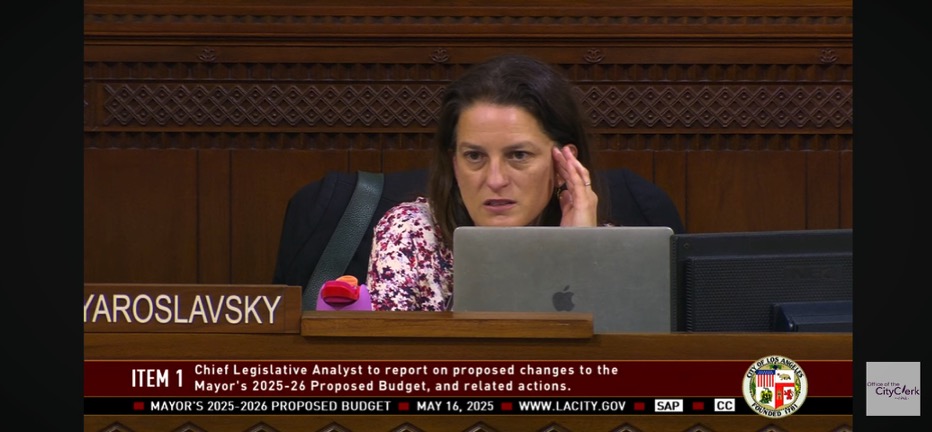Comments
ERIC PREVEN’S NOTEBOOK - It started, as so many stories do in Los Angeles, with a haircut.
There she was—Supervisor Janice Hahn—smiling sweetly in a Croatian national soccer jersey, proudly sporting what can only be described as a Triple-A Bob. The kind of graduated, slightly stacked cut that whispers “approachable grandma” but carries the precision of a surgeon's scalpel.
The bob triggered a wave of affection. Hahn, after all, is my favorite—sort of. She cries at the right moments. She gives the speech you want to hear, even if it won’t be followed by policy. She’s got backbone and banana bread energy. It’s ‘bless your heart’ with a SEIU punch.
But then I got home. And saw what had slipped through while I was gone: Item 59—a $4 billion Judgment Obligation Bond, approved without a whimper.
That’s not just adorable. That’s appalling.
It means the County is borrowing billions to settle lawsuits, primarily from decades of sexual abuse and institutional failure in departments like Probation and DCFS, and passing the bill, with interest, to future taxpayers. There’s no public list of cases. No reform. No plan. Just long-term debt to avoid reckoning with the harm.
I’ve seen this play before. In 2017, the City of Los Angeles proposed the same scheme. I barked. Loudly. I reached out to Dakota Smith at the L.A. Times—she wrote the piece. The idea slowed down. Maybe even died.
But in 2021, the City quietly brought it back. And passed it. The same bonds. The same evasion.
Then in 2023, Dakota and her colleagues—Wick, Zahniser, Oreskes—deservedly won a Pulitzer for the Nury tapes exposé. And I congratulated her in classic Preven style:
“Congrats to you and your hairstylist on the Pulitzer. Much deserved.”
She replied:
“Seriously. Thank you. Sorry my big hair blocked Julia’s face in the photo—but she’ll win another.”
Maybe.
But unless we start saying no to these JOB bonds, we’re all going to lose.
Because this isn’t just a haircut.
It’s a haircut for an entire generation.
![]()
Triple A Bob.
The County will be paying down this $4 billion JOB for decades, while workers are striking for living wages, while basic services collapse under the weight of interest payments, while the agencies that caused the harm keep doing business as usual.
And while the United States' credit rating is being downgraded, Los Angeles County sits smug in its triple-A bubble. Proud of it. Like nothing's wrong.
That’s not just fiscal denial. That’s a special ring of hell—being fat, dumb, and balanced while the children under your care are being molested by uniformed staff.
So yes, the bob looked great.
But this bond?
This bond cuts deep.
Right to the bone.
“Cure & Correct” Isn’t a Promise—It’s a Pattern
At Friday’s Los Angeles City Council meeting, the public received something rarely offered: a mea culpa from the most corrupt council in America.
Item 24—an ordinance to raise wages for hotel workers and LAX staff to $30/hour by 2028—had to be re-agendized and re-voted after the Council quietly violated the Brown Act earlier in the week. The offense? Amendments were slipped in too late for public review before the vote. Council, ever magnanimous, “cured and corrected” the error. Case closed?
Not quite.
The Brown Act is California’s bare-minimum sunshine law. It doesn’t prohibit all backroom dealing—it just insists you bring the paperwork out front before you vote. It’s a law for the people who might want to read the fine print. It says: the public has a right to notice, to review, and to respond. Not after the fact. Not by scavenger hunt.
That’s why the “cure and correct” mechanism exists. If a city body gets caught cutting procedural corners, it can redo the item with proper notice, essentially resetting the legal clock. But this remedy, increasingly, has become routine. Not a rare misstep. A move.
It’s not a guarantee that the public won’t be steamrolled. It’s a guarantee that the steamroller gets to back up and try again.
And when the subject matter is this weighty—a $30 wage floor that could reverberate through the city’s tourism infrastructure and Olympic ambitions—you’d hope transparency would be automatic. Instead, it had to be demanded.
That’s where Rob Quan came in. During public comment, he laid it out:
“The Council and CLA moved significant changes to this item after the public comment period. This happens too often. There’s no transparency. And even when you ‘fix’ it later, the public is always the last to know. We deserve more than backdoor policymaking and ‘oops’ corrections.”
He’s right. This wasn’t a typo on a parking meter ordinance. This was an economic realignment of the city’s hospitality sector, with massive implications for small businesses, union contracts, and airport operations. If you're going to rewrite the rules for LAX's sales force and every hotel in sight, you’d better bring the public along for the ride.
Instead, the community was expected to be grateful for an acknowledgement, now “cured.” A technicality, not an apology.
While the Council was busy rerunning its legislative tape, it also unfurled a red carpet of ceremonial presentations. Jewish Heritage Month was the main event, with Councilmember Bob Blumenfield reading a roll call of distinguished Jewish Angelenos who contributed to the music business through reverent prose and some light nasal congestion. Councilmember Yaroslavsky offered warm words about family brisket and legal legacies. It felt heartfelt and oddly formal, like a tribute dinner that forgot to serve food.

How much?
That’s when the ghost of Redd Foxx could be heard.
After firing his writing staff and letting a group of new hopefuls rewrite a scene on Sanford and Son, Redd watched a dead performance. No rhythm. No laughs. He stood up, shook his head, and said the immortal words: “Get me my Jews.”
It wasn’t about religion. It was about rhythm. About having the right team to make the material sing. Watching Friday’s Council meeting, that sentiment felt all too familiar. This crew needed a punch-up pass. Not just to make it funnier. To make it right.
Because here’s the hard truth: “cure and correct” doesn’t fix the fundamental issue. It just erases the evidence. It lets the Council pretend the mistake never happened, while the public adjusts to a new normal of being notified after the fact, and invited to comment after the game.
This isn’t about who gets to make policy. It’s about how. Los Angeles is staring down a fiscal cliff, a housing crisis, a homelessness emergency, and an Olympics money pit—and its governance cannot rely on clerical resets and ceremonial distractions.
When a city fails to notify the public about last-minute changes, it shouldn’t be a “whoops.” It should be a warning. And when the public shows up to say so, they shouldn’t have to repeat themselves at a re-vote to be heard.
The public doesn’t want a second bite of the apple.
We want to be at the table when you serve it.
What Will People Think If We Stop Reading?
A few weeks ago, the Los Angeles Times Festival of Books reminded us literature’s not dead yet—not in a city still trying to finish at least one chapter between push alerts. And today brings another reason to celebrate: the launch of What Will People Think? by Sara Hamdan. A debut with global roots and timely resonance, it’s arriving at the Harvard Bookstore while Hamdan herself beams in from Dubai. Blame international chaos—but don’t miss the message. This is a novel about identity, ambition, and resisting the cultural whisper to sit down and be quiet.

Author of What Will People Think? Sara Hamdan
The tsimis lately? Drag queens reading to kids at the library—a flashpoint manufactured for school board tantrums and viral outrage. But the story that made me spit out my coffee wasn’t about costumes or story hour. It was a study showing that young people aren’t reading anymore—not books, not longform, not even dense tweets. And it freaked me right out.
Reading is writing. Writing is communication. And sharp communication? That’s power. So yes, thank you—applause.
Here’s the truth: I read a lot. But I’ll admit, it’s rare these days that I hunker down with a long book. I’ve read plenty, though—Ulysses, Tender Is the Night, Henderson the Rain King, Gravity's Rainbow, The Age of Innocence, The Asiatics. I went deep on American fiction, S.J. Perelman for the punchlines, P.J. O’Rourke for the political mischief, and the usual self-reliant bros, Emerson and Thoreau. And yes, I read poetry—on purpose. Lately, I’ve been intrigued by Ottessa Moshfegh’s Lapvona, a dark little fiefdom of satire, and My Year of Rest and Relaxation, which explores the extremes of escapism in modern life.
I went to the University of Michigan (Go Blue!), where I was lovingly shoved into the Great Books. I dove into Classical Civ, added Philosophy, Political Science, and even a course or two on War. I took acting. Starred in Chekhov. Fell for the librarian. Drove to Flint to meet her dad. Later, to Columbus to confirm that the relationship had ceased to function. That’s education, right? Books, heartbreak, Chekhov, and a long drive.
So is Herodotus. And Aristophanes—the funny one. And if you haven’t endured a blowhard professor’s Vietnam War novel, maybe you haven’t truly suffered.
Still, I get it. It’s hard to make time. Phones hollow us out like driftwood. Games are dopamine fire hoses. I’ve never played one deeply, but I see what they’re up against—and what we’re up against.
So what’s the move?
It’s time to unleash the Great Book Recommendation era. Not homework—just a nudge. A literary dare. Will I read every one? Maybe not. I’m preserving the essential hypocrisy that keeps me grounded.
We fight back by reading. Let your kids catch you. Use audiobooks. Visit libraries. Talk about books like they matter.
Books are the last safe space for dangerous thinking. Read one. Share one. Ruin someone’s algorithm.
Don’t Push Us Too Far
I read a thread on Twitter the other day about how rough it was to be born in 1900. One of those “perspective, people!” posts, clearly designed to calm everyone down by reminding us that things have been worse.
And yeah, context can be comforting. So here’s the gist:
If you were born in 1900, your life was basically a montage of catastrophes. At 14—World War I. Twenty-two million dead before you’re old enough to vote. Then the Spanish Flu hits—takes out fifty million more before you can legally rent a car.
At 29: The Great Depression. GDP drops off a cliff. One in four Americans is out of work. Breadlines, Hoovervilles, and a whole lot of canned beans.
At 39: World War II. By 41, you’re in it. Seventy-five million perish. Six million were murdered in the Holocaust.
At 52: Korea. At 62: Cuban Missile Crisis. The world holds its breath, and Kennedy signs the canned peach order. At 64: Vietnam, with nightly kill counts on TV. Another four million dead.
And just as you hit 75? Nixon helicopters off the White House lawn, and your back gives out.
So yes—compared to that, the Erewhon smoothie crisis and the meltdown over a glitched mindfulness app seem a little… tender.
But here’s the thing: change is hard. It always has been. And pain—especially shared pain—can build resilience. What we can’t normalize is bullying. Not the social kind, not the systemic kind, and definitely not the kind that gets codified into policy.

They protect their own.
Because when bullying becomes law, people will push back.
Think Flint sit-down strike, 1936. Or Selma, 1965. Stonewall, ‘69. Standing Rock. Even those school walkouts after Parkland. When the line is crossed—when leaders mock, gaslight, or criminalize vulnerability—the people remember their strength. And they organize.
Sometimes, a bully really can make the world better by standing up to another bully. But when a bully picks on the weak? Exploits fear? Builds policy around cruelty?
That doesn’t end in growth. That ends in revolt.
And history doesn't tend to be kind to those who forgot that.
(Eric Preven is a Studio City-based TV writer-producer, award-winning journalist, and longtime community activist who won two landmark open government cases in California.)










